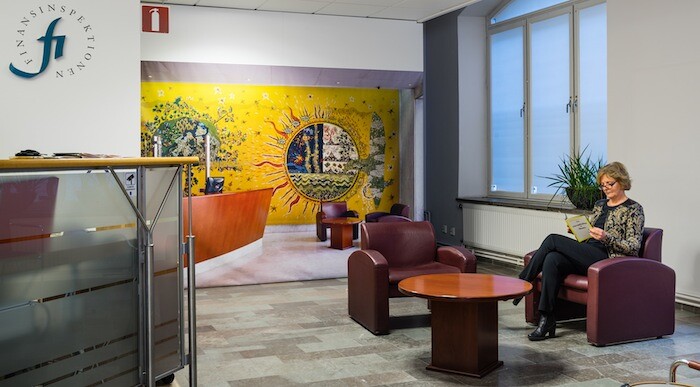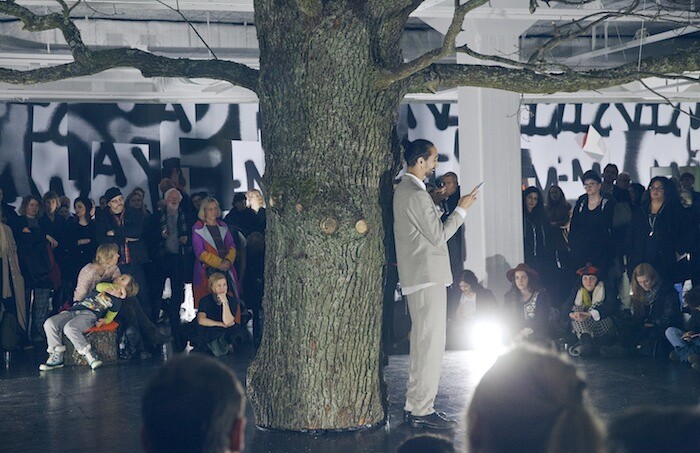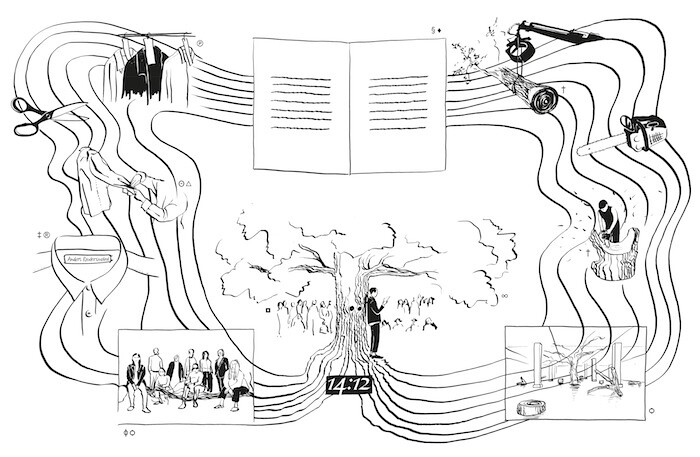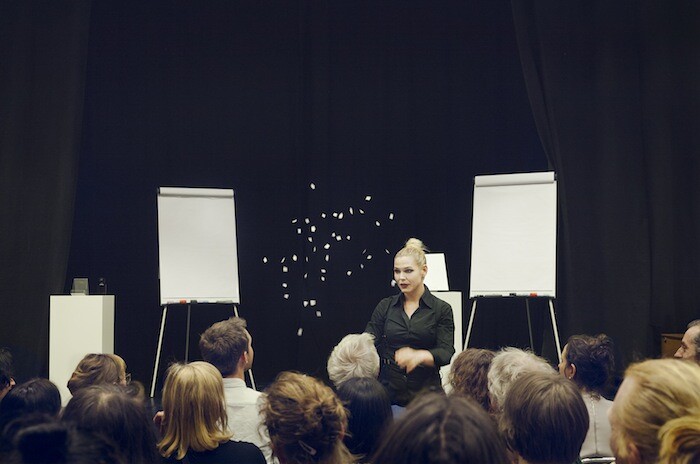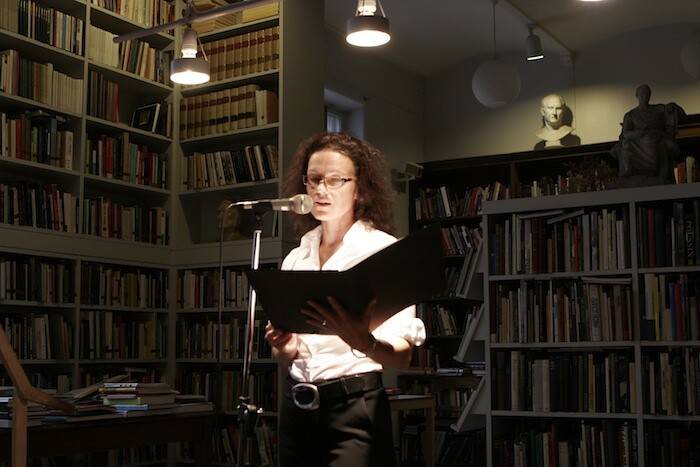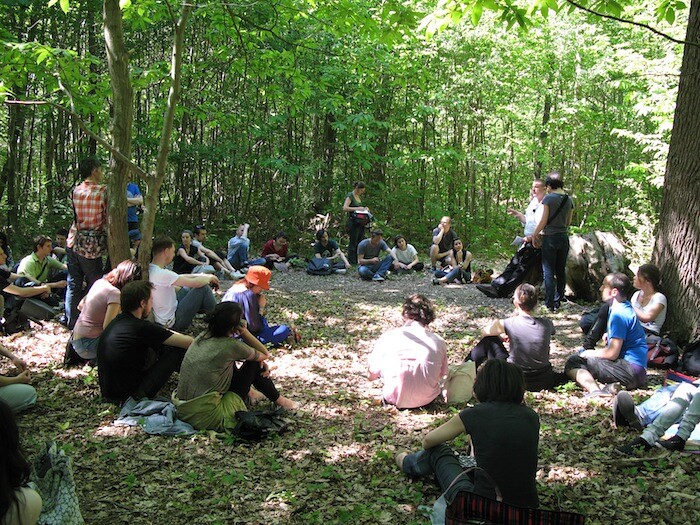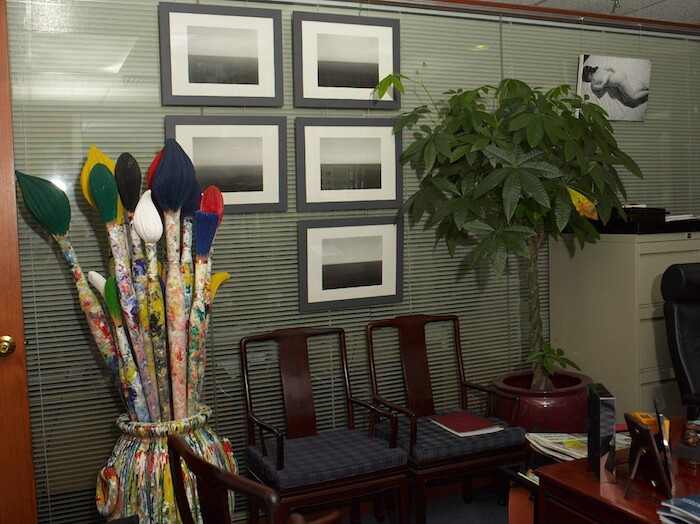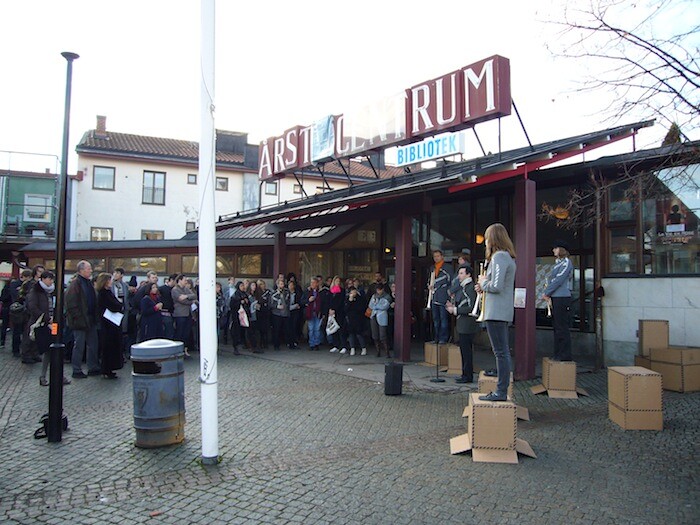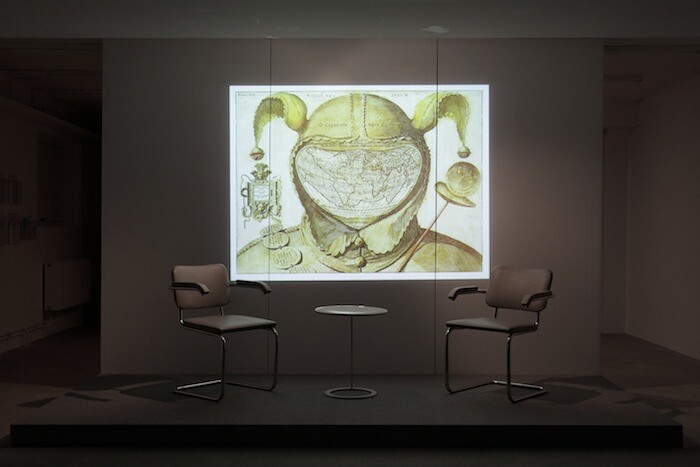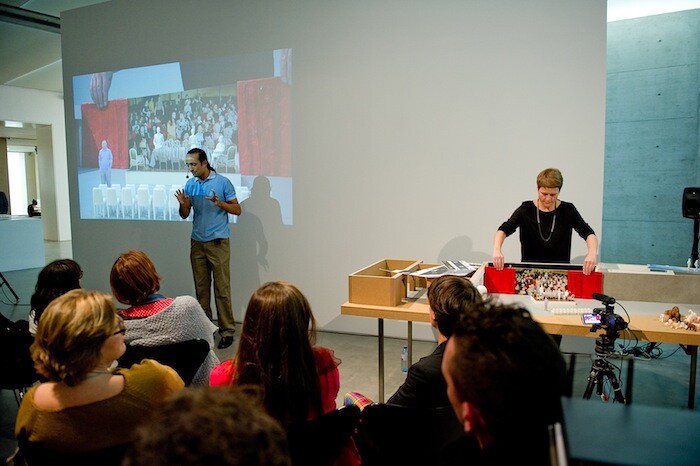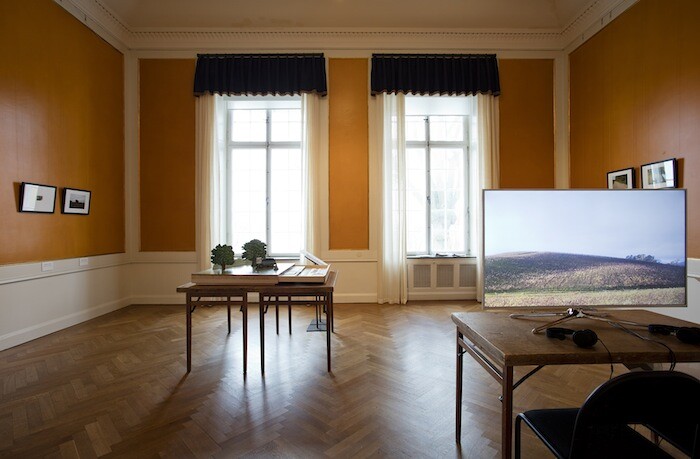(Libretto Adapted by Pamela Carter)1
Cast
Maria Lind — Mezzo-Soprano Goldin — Tenor Senneby — Baritone Security Manager — Soprano Staff and Visitors — Chorus Elephant — Non-singing
Scene
The lobby of the Financial Supervisory Authority, Stockholm. 3 p.m., November 23, 2016.
Artists Goldin and Senneby are waiting for curator Maria Lind, with whom they have agreed to record a conversation for art-agenda. Earlier in the year, Lind curated “Standard Length of a Miracle,” a retrospective of their work staged in different locations across Stockholm.2
Goldin holds a large package. Senneby sets up recording equipment.
Visitors and staff come and go.
Elephant sits alone by the street entrance.
Lind enters.
Lind/Goldin/Senneby
Hej hej Hej hej hej Hej hej hej hej hej
Lind
So. Shall we start with a question?
Goldin/Senneby
Let’s start with the bribe.
Lind
Ha. And what do you want in return?
Goldin/Senneby
Maria, It’s not a simple balance of payments In the gift economy.
Lind
Is it long-term emotional debt?
(Lind unwraps her gift)
Chorus
This is the Financial Supervisory Authority. It’s a state agency Promoting stability, efficiency Ensuring our financial protection.
Goldin/Senneby
It’s a map
Lind
Beautiful.
Goldin/Senneby
Of the retrospective we produced together. It was your idea to stage all of our older works In outside locations.
Lind
I wanted to activate your older works Have them resonate in relation To particular settings.
Chorus
In spring We hosted a Goldin and Senneby artwork here. We hosted their audiences here. We remember.
Goldin/Senneby
You have a history Of strong curatorial framing Which comes as a consequence Of the artistic practice.
Lind
Which grew from a concern That the work of many artists Doesn’t lend itself To a classical retrospective. Because a work relates more to external contexts Than to a previous or subsequent work By the same artist.
Goldin/Senneby
I was very happy How the locations played out for us.
Lind
The way places and people working in these places Embraced the projects Made them their own Exceeded my expectations.
Chorus
But what are they doing back here? Do they have an appointment?
Lind
What question would you like to consider?
Goldin/Senneby
We’re less question-focused.
Lind
Let’s think about this question of context then. Sweden. How it has shaped your way of thinking.
Goldin/Senneby
It’s hard to see It’s hard to know It’s why we avoid the question I’m not so interested in Identitarian It’s hard to be reflective.
(Lind
Not identitarian)
Goldin/Senneby
Our work has been About globalization, about financialization. A networked sphere, A networked economy. So we’re not so interested in Identitarian
(Lind
In this part of the world)
Goldin/Senneby
It’s more about Distribution Dislocation.
(Lind
Access to networks Good internet connection)
Goldin/Senneby
Sure. Absolutely. (‘This part of the world’ in a general sense) But now you bring it up Looking at my own background Before I turned to art (Artistically, Sweden is peripheral) Working with the internet Working with that language Working with that mindset or idea Of how to shape a society that uses these communicative tools. When I turned to art, that was my main concern. And when I started doing art I didn’t want to do it alone I wanted to do it with other people.
Chorus
This is a society that puts a lot of resources Into structure, production And organization.
Goldin/Senneby
I don’t know if that comes from my background It’s hard to be reflective. Maria What about you, Maria?
Lind
I am only possible as a phenomenon in Sweden. As a woman Brought up knowing you can do what anyone else can do. I am indebted to the ideology of the 1960s and ‘70s, Free tuition and good student loans.
Lind/Goldin/Senneby
We acknowledge our privileged positions.
Lind
But that doesn’t mean I’m not ambivalent towards the system. The status quo is never to be trusted. Public institutions like this Are here to be used.
Chorus
But we want to know What are they doing here?
Lind
Change doesn’t happen by itself So better you step in Try to effect change yourself Life is as fun as you make it.
Chorus
But this is The Financial Supervisory Authority.
Goldin/Senneby
Sitting here in this lobby Makes us think How our work and yours Has intersected over the years.3
Lind
Staying with an artist Or question Over a number of years Is inspirational to me You involve many different people in your work You’re promiscuous in your collaborations.
Goldin/Senneby
I’m not sure we collaborate with anyone but each other.
Lind
You ‘work together with.’
Goldin/Senneby
We ‘work together with’ We let people act as themselves Within a framework we have defined. If the stage we provide functions It distributes as much agency as possible. The more our agents can use their full capabilities And still be legible within our framework The more productive it is for us. We very rarely work with other artists. Never. Maybe. It’s interesting for us when a relation takes on a life of its own When we’re pulled into someone else’s mind or problem or anger. Take Howard Bilton4 We tried to make him a prop in our project But then he wanted a voice in our work.
Lind
You set balls rolling.
Goldin/Senneby
We set balls rolling. That’s distribution of agency. It’s about producing these relations Not about fixing meanings or messages.
Lind
Is there one ball you’re particularly fond of?
Goldin/Senneby
Hmmm. Hmmmmm. That’s hard to say5 Some balls have evolved Into substantial… Take Angus Cameron6 He’s an actor within our work And our work appears as a trope in his.
(Security Manager approaches them)
Security Manager/Lind/Goldin/Senneby
Hej hej Hej hej hej Hej hej hej hej hej
Security Manager
We’ve met before. Yes
Goldin/Senneby
We met in the spring. We had a show here in the spring. We thought we might be nice to sit here And talk about the show About art.
Security Manager
Yes But you don’t have an appointment You didn’t call to inform us.
Goldin/Senneby
In the spring The Head of Communications Told us this is public space She underlined, this side of the security gates Is public space.
Security Manager
We are a government agency, yes. But it’s not appropriate for anyone to come here, have meetings. If you’d called ahead, we’d have said ‘super’ But
Goldin/Senneby
Can we stay to finish our conversation?
Security Manager
Ok. But next time We need notification.
Goldin/Senneby
Yes, of course. We’re sorry, so sorry.
(Security Manager leaves)
Lind/Goldin/Senneby/Security Manager
Bye bye bye bye Bye bye
Chorus
They’re just talking? About art? Is that all they’re doing?
Lind
We were talking about Balls. Balls rolling.
Goldin/Senneby
Does how we work with others Compare to your work as curator?
Lind
Similar. But not thematized. But I agree The way to do it Is with other people. It’s quite boring otherwise. Right now I’m closer to grassroots organizing More interested in how art sits in society Its negotiations and communications.
Goldin/Senneby
We don’t think about us Producing work for an audience. I think we are first already each other’s audience. We think we are much more of a sect-like organization. We bribe people To get involved. We think there are different levels of engagement. There are people we employ directly Who are on the payroll. There are people who are implicated Whether they want it or not. There are people who produce relationships in turn Have their own understanding of the work. That’s how we think The work lives in the world. Which is why we’re concerned We’re cautious About this kind of conversation. We’re cautious not to close down (Short-circuit) Not to impose A final voice.
Lind
You know we’re supposed To talk about process.
Goldin/Senneby
For you When does a ball roll?
Lind
Ok. This is to do with Accumulation or critical mass Over time Short, intensive Or longer and dispersed. A scientific definition of criticality When something transforms through external And internal forces It is very situational. Can we talk about process?
Goldin/Senneby
For us the process is the work.
Lind
Partly, yes.
Chorus
Why won’t they talk about the process?
Goldin/Senneby
The narrative around our work Shouldn’t come from us.
Lind
But it doesn’t have to exclude you.7
Goldin/Senneby
No but we’re alert to what can go wrong. Switching to I understand the problem But switching to The Elephant …
(Everyone turns to look at Elephant)
Chorus
Where did the Elephant come from? Who let the Elephant in? Who is responsible for the Elephant?
Goldin/Senneby
Our previous work Let’s say, “Headless” Has turned its eye on neoliberal networks
(Elephant stands)
On the hidden and not so hidden Practices of neoliberalism. Let’s say our practice has been read By others And to a certain extent ourselves As related to A certain time-period marked by Financialization and globalization. And let’s say now There’s a very strong case Against financialization and globalization
(Elephant walks slowly across the lobby towards the security gate)
Coming from A new conservative right-wing movement. A fascist, anti-liberal, nationalist movement. And for us It’s become urgent To think about What our work can do In a totally new context.
(Elephant walks through the security gates and disappears into the Agency)
Lind/Goldin/Senneby/Chorus
The Elephant What is the Elephant up to? Does the Elephant have an appointment?
The End
I have been employed by G+S since 2010, initially as a playwright and now as a librettist.
Goldin+Senneby’s project “Headless” had its first public moment during a Iaspis residency in 2007, when Lind was the director. “Headless” would later become central to Lind’s thinking on abstraction and her research project “Abstract Possible” (2010-2012). The novel Headless was co-published with Tensta konsthall in 2015, and in the 2016 retrospective the Financial Supervisory Authority was the site of a “Headless”-related installation.
Founder and Chairman of The Sovereign Group, the offshore management company which registered Headless Ltd, the focus of G+S’s long-lasting project of the same name.
I feel disappointed not to have been mentioned here.
Cameron, a political economist, has been spokesperson for G+S on “Headless” since 2008.
Initially, G+S had suggested that Lind might speak to three of their “employees” rather than talk with them directly. However Lind was concerned that talking with emissaries might not be so interesting.
